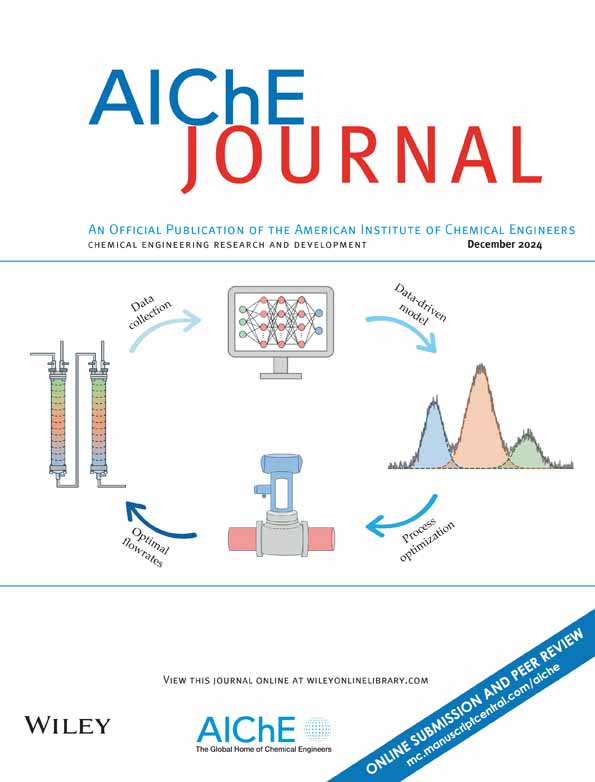氨合成反应器的基于学习的估计和非线性预测综合控制
IF 3.5
3区 工程技术
Q2 ENGINEERING, CHEMICAL
引用次数: 0
摘要
本文提出了一种先进的基于机器学习的氨合成反应器动力学预测建模、状态估计和反馈控制框架。采用高保真二维多物理场模型生成综合数据集,捕获各种操作条件下的可变动力学。代理长短期记忆神经网络经过训练,可以实现实时预测和基于模型的控制。此外,开发了一个前馈神经网络,利用空间分布的温度读数来估计出口氨浓度和热点温度,从而解决了实时浓度和最高温度测量相关的挑战。将基于机器学习的预测建模和状态估计方法集成到模型预测控制体系结构中来调节氨合成。仿真结果表明,与高保真度模型相比,机器学习替代模型准确地表征了非线性过程动力学,误差最小,同时降低了优化成本,保证了反应器的自适应性和对所需设定值的有效引导。本文章由计算机程序翻译,如有差异,请以英文原文为准。
Integrated learning-based estimation and nonlinear predictive control of an ammonia synthesis reactor
This paper presents an advanced machine learning-based framework designed for predictive modeling, state estimation, and feedback control of ammonia synthesis reactor dynamics. A high-fidelity two-dimensional multiphysics model is employed to generate a comprehensive dataset that captures variable dynamics under various operational conditions. Surrogate long short-term memory neural networks are trained to enable real-time predictions and model-based control. Additionally, a feedforward neural network is developed to estimate the outlet ammonia concentration and hotspot temperature using spatially distributed temperature readings, thereby addressing the challenges associated with real-time concentration and maximum temperature measurements. The machine learning-based predictive modeling and state estimation methods are integrated into a model predictive control architecture to regulate ammonia synthesis. Simulation results demonstrate that the machine learning surrogates accurately represent the nonlinear process dynamics with minimal discrepancy while reducing optimization costs compared to the high-fidelity model, ensuring adaptability and effective guidance of the reactor to desired set points.
求助全文
通过发布文献求助,成功后即可免费获取论文全文。
去求助
来源期刊

AIChE Journal
工程技术-工程:化工
CiteScore
7.10
自引率
10.80%
发文量
411
审稿时长
3.6 months
期刊介绍:
The AIChE Journal is the premier research monthly in chemical engineering and related fields. This peer-reviewed and broad-based journal reports on the most important and latest technological advances in core areas of chemical engineering as well as in other relevant engineering disciplines. To keep abreast with the progressive outlook of the profession, the Journal has been expanding the scope of its editorial contents to include such fast developing areas as biotechnology, electrochemical engineering, and environmental engineering.
The AIChE Journal is indeed the global communications vehicle for the world-renowned researchers to exchange top-notch research findings with one another. Subscribing to the AIChE Journal is like having immediate access to nine topical journals in the field.
Articles are categorized according to the following topical areas:
Biomolecular Engineering, Bioengineering, Biochemicals, Biofuels, and Food
Inorganic Materials: Synthesis and Processing
Particle Technology and Fluidization
Process Systems Engineering
Reaction Engineering, Kinetics and Catalysis
Separations: Materials, Devices and Processes
Soft Materials: Synthesis, Processing and Products
Thermodynamics and Molecular-Scale Phenomena
Transport Phenomena and Fluid Mechanics.
 求助内容:
求助内容: 应助结果提醒方式:
应助结果提醒方式:


